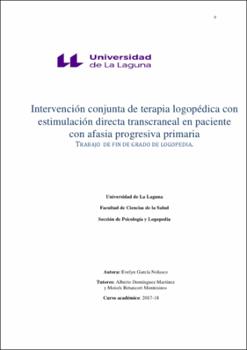Intervención conjunta de terapia logopédica con estimulación directa transcraneal en paciente con afasia progresiva primaria
Date
2018Abstract
La afasia progresiva primaria (APP) es un síndrome neurodegenerativo caracterizado por un deterioro progresivo del lenguaje, siendo ésta la única área afectada, al menos durante los dos primeros años de enfermedad, preservando el resto de facultades mentales. Existen tres subtipos clínicos: APP-no fluente, APP-semántica y APP-logopénica. En este trabajo, realizado con un paciente con APP- logopénica, se ha empleado una intervención conjunta de estimulación de corriente directa transcraneal (tDCS) con terapia logopédica intensiva y restringida, para valorar si existe una mejora más importante que con el tratamiento logopédico por sí solo. Se ha utilizado un diseño de base múltiple, realizando tres evaluaciones durante el proceso. Los resultados obtenidos afirman que la terapia logopédica por sí sola produce mejoras notables en la mayoría de tareas, excepto en la repetición y la memoria fonológica a corto plazo. Sin embargo, la terapia conjunta con tDCS no produce
mejoras llamativas, aunque es importante tener en cuenta que el deterioro constante en estos pacientes puede estar influyendo. The primary progressive aphasia (PPA) is a neurodegenerative syndrome that is characterized by a progressive damage of the language, being this the only affected area, at least for the first two years of illness, preserving the rest of mental abilities. There are three subtypes: nonfluent PPA, semantic PPA and logopenic PPA. In this work, performed with a patient with APP-logopenic, a joint transcranial direct current stimulation (tDCS) intervention with intensive and restricted logopedic therapy has been used to assess whether there is a more important improvement than with the speech therapy treatment alone. It has been used a
multiple base design, performing three evaluations during the process. The obtain results confirm that, the logopedic therapy by it’s own produces significant improvements in the majority tasks; excepting repeating and short term memory. However, the combine therapy with tDCS doesn´t produce significative progress, although it’s important keep in mind that, the constant decline of these patients may be influencing.





